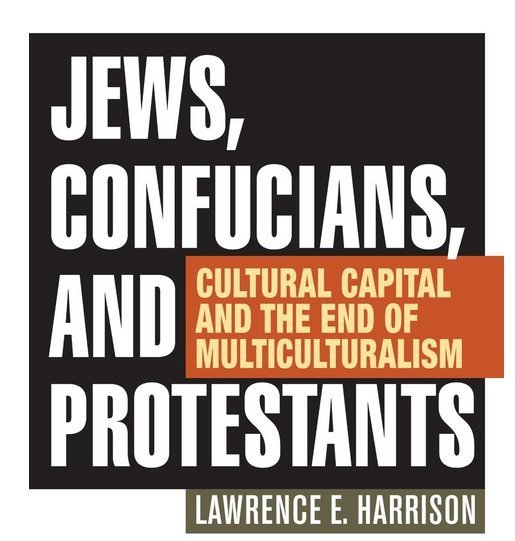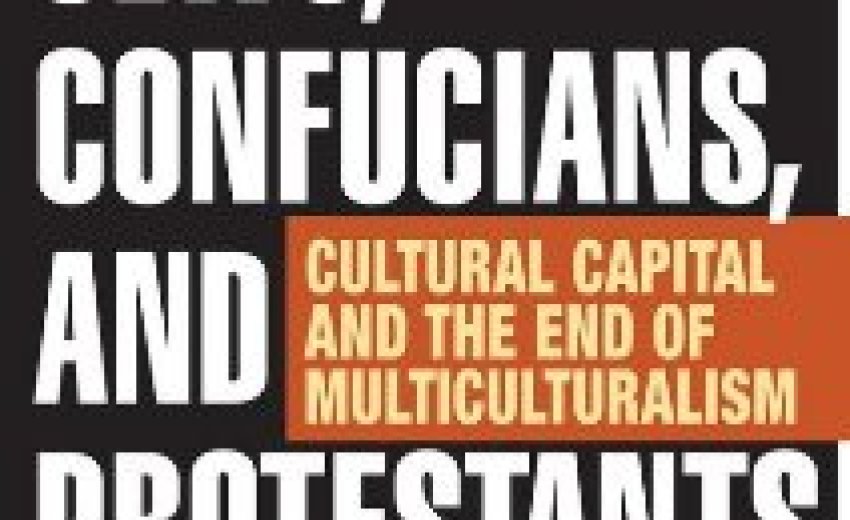Jews, Confucians, and Protestants
Cultural Capital And The End Of MulticulturalismLawrence E Harrison
July 19, 2013: Mr. Harrison directed USAID Mission in five Latin American Countries, after retirement was at Harvard University for eight years, then taught at Tufts University and inaugurated the Cultural Change Institute. His first hand experience in the field inspired him to author this first of a kind landmark study of "Culture" as a crucial, though largely ignored factor in the development of nations/societies.
The Social Sciences have been producing a number of studies and books investigating various elements, especially mores, as essential ingredients of the successful societies.
His literature research takes him to subjects like: Multiculturalism, Religious Relativism, The Economist's "Relativism", Foreign Policy Implications, Race Immigration, Historical evidence and even most recent global surveys and even headlines.
He starts with the recently popularized term "Cultural Capital", but then he goes into its finer elements and comes up with four major Divisions and subdivisions as under:
(1) WORLD VIEW with further five subdivisions: Religion, Destiny, Wealth and Knowledge.
(2) VALUES, VIRTUES with three subdivisions: Ethical Code, The lesser virtues and Education.
(3) ECONOMIC BEHAVIOR with seven subdivisions: Work/achievement, Frugality, Entrepreneurship, Risk propensity, Competition, Innovation, Advancement.
(4) SOCIAL BEHAVIOR with ten subdivisions: Rule of law/corruption, Radius of identification and trust, Family, Association (social capital), the individual/the group, Authority, Role of Elites, Church-state relations, Gender relationships, Fertility.
He has not devised a measuring scale for these TWENTY FIVE elemental traits, but uses various global studies for one or the other element in rating the targeted societies of the study. In places he uses his subjective evaluations to sort out "High Cultural Capital" and "Low Cultural Capital" Societies.
Since most of the studies and literature available to him pertained to Judo -Christianity, Islam and some East Asian nations (falling in the category of Confucians), he comes up with Three Winners - Jews, Confucians and Protestants. Any reader can intuitively agree with him. He also concludes two losers - Catholics and Most of the Islamic countries.
His sharp eye though recognizes some other High Achievers too :
(1) Basques - though are converts to Catholics, but have retained some of their original and pre-conversion mores, which propel them to "High Achievers."
(2) SIKHS. He has not done any study on Sikhs, but have included about four pages contributed by The Sikh Foundation, giving quotes from Sri Guru Granth Sahib on all the 25 elements identified by as the ingredients of "Achievers".
(3) Mormons are also identified as achievers, though Christians, but not Protestants.
(4) Ismailis have been identified as other achievers, as a subset of Islam.
No doubt, it is a first study of its kind. Instead of answering questions, it in fact gives birth to many questions:
(1) How come Hinduism, one of the major religions of the world, dominant in India and with one of the longest known civilization and now contender to one of the world power has not been given a space in this study?
(2) Buddhism, another world renowned religion and very ancient roots, predominant in various countries has also not been given a fair shake.
(3) Parses is another strong achievers group and needs a fair place in that group.
(4) Are the "Low Achievers" kind of cesspools/ morbid?
(5) In the fast growing globalism and multiculturalism, intermingling of "low achievers" in "High achieving groups", what societal, institutional, political challenges will crop up and how best to convert the low achievers to high achievers rather than dragging the first world countries getting drawn down to the third world level?
(6) For Sikhs, it highlights a huge challenge, one to produce credible studies and literature to support their inclusion in High Achievers, secondly to develop internal quality control mechanism that Sikhs continue to stay in that category of High Achievers, rather than slide into a cesspool.
It sure is a recommended reading for all the Sikh Intellectuals, Community Leaders particularly the Academia, and Sikh youth.
Jasbir Singh Sethi
Houston
[email protected]
 |
| By Lawrence E. Harrison Rowman & Littlefield Publishers, Inc. Lanham, Maryland (USA) Pages: 230 (2013) Price: $32.59 & FREE Shipping.......Source |
Book Description
Release date: December 28, 2012 | ISBN-10: 1442219637 | ISBN-13: 978-1442219632
Multiculturalism—the belief that no culture is better or worse than any other; it is merely different—has come to dominate Western intellectual thought and to serve as a guide to domestic and foreign policy and development aid. But what if multiculturalism itself is flawed? What if some cultures are more prone to progress than others and more successful at creating the cultural capital that encourages democratic governance, social justice for all, and the elimination of poverty? In Jews, Confucians, and Protestants: Cultural Capital and the End of Multiculturalism, Lawrence E. Harrison takes the politically incorrect stand that all cultures are not created equal. Analyzing the performance of 117 countries, grouped by predominant religion, Harrison argues for the superiority of those cultures that emphasize Jewish, Confucian, and Protestant values. A concluding chapter outlines ways in which cultural change may substantially transform societies within a generation.
Editorial Reviews
Review
Sailing into stiff headwinds, Harrison challenges the belief—foundational to multiculturalism—that all cultures are equally valuable. Some cultures, he argues, simply are better than others at fostering economic growth, democratic governance, and social justice. It is, he asserts, a culture of education, frugality, and intracommunity trust that makes Jews financial titans. Likewise, a culture of learning and personal moderation empowers Confucian entrepreneurs in Japan, Taiwan, and South Korea. And it is a culture of hard work coupled to personal responsibility that elevates Protestants to top positions in global business. Other cultures—tradition-bound Catholicism, fatalistic Islam, and irrational Voodoo—come in for censure as obstacles to progress. Likewise labeled as barriers to advancement are contemporary cultural patterns among African Americans and Latino immigrants. Clearly separating himself from conservatives, Harrison outlines a progressive agenda based on deliberate cultural engineering. Still, in trying to test this agenda, Harrison’s Cultural Change Institute has encountered considerable resistance. That resistance persists in sharp debates sure to bring readers, both partisans and critics, to this book.......(Booklist)
Lawrence Harrison has written a book of bracing intellectual courage and luminous clarity. A brilliant assault on the cardinal principles of multiculturalism. Written with both sweep and detail, the writing fluid and engaging throughout. A seminal contribution to the link between culture and human progress.......(Fouad Ajami, Senior fellow at the Hoover Institution, Stanford University, cochair of the Herbert and Jane Dwight Working Group on Islamism and the International Order)
[Harrison] lays out a convincing case, albeit politically incorrect, that will be unfairly attacked by the usual cast of characters. It is the best argument against multiculturalism and multicultural equivalence I have ever read. . . . I hope this book not only gets wide reading and acceptance among the general public, but perhaps even more important, among bureaucrats, governments, philanthropic and NGO leaders, as well as academics, so that positive actions can result from [Harrison's] efforts. .......(Steven Pease, author of The Golden Age of Jewish Achievement and co-chair of the US-Russia Foundation)
Harrison has the courage to write the truth, a dangerous virtue these days. .........(Thomas Sowell, Rose and Milton Friedman Senior Fellow on Public Policy at the Hoover Institution, Stanford University) ....Source
